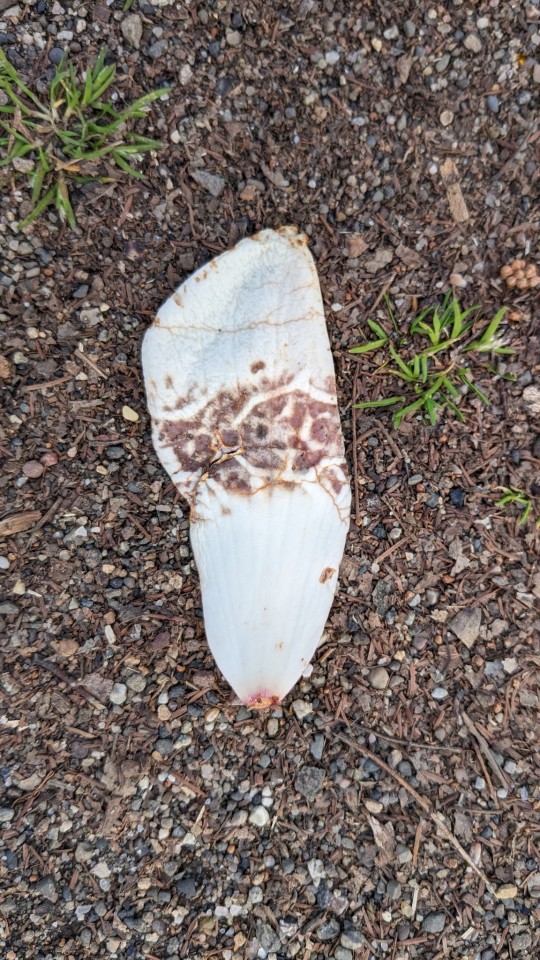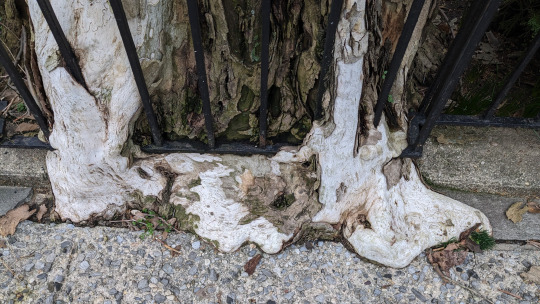Text
In the path of totality
Dillard:
Now the sky to the west deepened to indigo, a color never seen. A dark sky usually loses color. This was a saturated, deep indigo, up in the air. Stuck up into that unworldly sky was the cone of Mount Adams, and the alpenglow was upon it. The alpenglow is that red light of sunset which holds out on snowy mountain tops long after the valleys and tablelands are dimmed. “Look at Mount Adams,” I said, and that was the last sane moment I remember.
I turned back to the sun. It was going. The sun was going, and the world was wrong. The grasses were wrong; they were platinum. Their every detail of stem, head, and blade shone lightless and artificially distinct as an art photographer’s platinum print. This color has never been seen on earth. The hues were metallic; their finish was matte. The hillside was a nineteenth-century tinted photograph from which the tints had faded. All the people you see in the photograph, distinct and detailed as their faces look, are now dead. The sky was navy blue. My hands were silver. All the distant hills’ grasses were finespun metal which the wind laid down. I was watching a faded color print of a movie filmed in the Middle Ages; I was standing in it, by some mistake. I was standing in a movie of hillside grasses filmed in the Middle Ages. I missed my own century, the people I knew, and the real light of day.
I looked at Gary. He was in the film. Everything was lost. He was a platinum print, a dead artist’s version of life. I saw on his skull the darkness of night mixed with the colors of day. My mind was going out; my eyes were receding the way galaxies recede to the rim of space. Gary was lighters away, gesturing inside a circle of darkness, down the wrong end of a telescope. He smiled as if he saw me; the stringy crinkles around his eyes moved. The sight of him, familiar and wrong, was something I was remembering from centuries hence, from the other side of death: yes, that is the way he used to look, when we were living. When it was our generation’s turn to be alive. I could not hear him; the wind was too loud. Behind him the sun was going. We had all started down a chute of time. At first it was pleasant; now there was no stopping it. Gary was chuting away across space, moving and talking and catching my eye, chuting down the long corridor of separation. The skin on his face moved like thin bronze plating that would peel.
From all the hills came screams. A piece of sky beside the crescent sun was detaching. It was a loosened circle of evening sky, suddenly lighted from the back. It was an abrupt black body out of nowhere; it was a flat disk; it was almost over the sun. That is when there were screams. At once this disk of sky slid over the sun like a lid. The sky snapped over the sun like a lens cover. The hatch in the brain slammed. Abruptly it was dark night, on the land and in the sky. In the night sky was a tiny ring of light. The hole where the sun belongs is very small. A thin ring of light marked its place. There was no sound. The eyes dried, the arteries drained, the lungs hushed. There was no world. We were the world’s dead people rotating and orbiting around and around, embedded in the planet’s crust, while the earth rolled down. Our minds were light-years distant, forgetful of almost everything. Only an extraordinary act of will could recall to us our former, living selves and our contexts in matter and time. We had, it seems, loved the planet and loved our lives, but could no longer remember the way of them. We got the light wrong. In the sky was something that should not be there. In the black sky was a ring of light. It was a thin ring, an old, thin silver wedding band, an old, worn ring. It was an old wedding band in the sky, or a morsel of bone. There were stars. It was all over.
Paglia:
Human life began in flight and fear. Religion rose from rituals of propitiation, spells to lull the punishing elements. To this day, communities are few in regions scorched by heat or shackled by ice. Civilized man conceals from himself the extent of his subordination to nature. The grandeur of culture, the consolation of religion absorb his attention and win his faith. But let nature shrug, and all is in ruin. Fire, flood, lightning, tornado, hurricane, volcano, earthquake—anywhere at any time. Disaster falls upon the good and bad. Civilized life requires a state of illusion. The idea of the ultimate benevolence of nature and God is the most potent of man’s survival mechanisms.
2 notes
·
View notes
Text

Fisheyed Bob, he's mixed up in the center-storm
Blurred fringe, blazer prince, head hunched, cat clenched
Stink-eyed voyeurism broke-up by the little lord
Stoppin him from readin bout the sex of Jeannie Harlot.
He's still got her cufflinks on, reminiscent rusty
Didn't have a model growin up so now he's got three
Hey there pussycat welcome into my arms
Red-blooded flings keep him from gettin dusty
Sally's got a red dress, sittin on a chaise longue
Gift of Peter Paul & Mary, puffin on a deathstick
Only there on orders of the Big Men in the office
Knowing how her sex sells, showin off her moss cleft
Table's got a Time mag, showin off a landslide,
Mahollers from the mantelpiece for ole Ruby Johnson
Shankar sleeves and Von Schmidt,
A two-way harmonica for fallout needs a godsend.
0 notes
Text
Oh, I hate you some, I love you some /
Oh, I love you when I forget about me
1 note
·
View note
Text
I was hearing a fable. The husband never gets sick and the wife is permanently ailing. You read the story and you observe that the husband never complains and the wife is always complaining.
Listen to the story. The husband praises things, appreciates things, says so all the time. He might go so far as to praise his tools, his saw, say, his log-lifter. They live in the country. His wife is mired in not liking much of anything, aside from her ailments. He’s like the Basarwa are, apologizing to the animals they kill and praising the totem of the genus, thanking it.
The husband goes out of his way to try to demonstrate to his wife that she lacks a certain thing, which you could call gratitude. He has a philosophy of gratitude of a certain explicit or even crude sort, which he rightly or wrongly thinks may be at the heart of the difference between them, his better luck. But a thing about his philosophy of gratitude is that it has to be spontaneous, or come spontaneously, to work. It can’t be a rote thing like saying grace. He feels all he can do is exemplify what he feels, because, and this may be irrational, he feels that if he instructs her or catechizes her into it, not only will it not work for her but he himself might then lose the benefits of his attitude to the world. By the way, both of them are atheists, so this is not about religion. But how this story ends is a problem. One way it could end would be his telling her, and her laughing. And then they both begin to decline.
—Mating, Norman Rush
1 note
·
View note
Text
People started to use "aligned" and "misaligned" like a Christian might use "saved" and "damned."
0 notes
Text
They were breaking ground on a new storefront, a drivethru that would sell you cannabis and chopped salads from your car. "Leafy greens with your leafy greens," went the commercial jingle.
0 notes
Text

Reflected arboreal structure broken by ripples of raindrops, Prospect Park, March 2024.
1 note
·
View note
Text
There were exorcisms, expulsions, exclusions, exhibitions, and excommunications. Everyone had a firm opinion. Everyone knew what was right. Everyone agreed with their peers. My political opinion was that if everyone was exploiting, I would explore; if everyone was acting, I would understand; if everyone was speaking, I would listen.
0 notes
Text
I wanted my entire oeuvre to be a ring composition. I wanted to end where I began: with authenticity, and nostalgia. A lifetime of inquiry spun out from two simple questions: Is the world getting better, or worse? And what does it mean, to "keep it real"? These were hippy questions, Sixties questions. About identity, performance, utopia. In every change of culture and ideology, what had we lost and what had we gained? In every apparent self-liberation, how might we also have become more enslaved?
1 note
·
View note
Text
Old Kingdom authority
Venetian stones
Shall we polish the rusted armor?
The leather straps are long since dust.
0 notes
Text
Twilight, like many feminine sexual fantasies, features an Outsider who at once rejects the standards of the heroine's society, while simultaneously (and this is critical) being more powerful than any member of that society. (See Austen's Mr. Darcy for precedent.) This power both justifies and enables the Outsider's rejection of social normativity—offering a picture of total freedom without the usual costs accrued by disdain.
This Outsider is often, at once, a savior and a parasite—see the dual nature of the Serena-Dan relationship in Gossip Girl, the way each uses and idealizes the other for personal projects, the way each sees in the other an opportunity to attain a larger world (sees an escape from their own world's constricting confines).
And as my friend RIPDCB points out, the Confederate vampire (see e.g. Bill in True Blood) epitomizes this duality, being a metaphor for the dual nature of the Antebellum South: both its glamour/wealth/beauty, and the parasitic system of violent extraction that underlies the glamour. There is, in this way, something both masculine and effete about the vampire, in their playing and excelling at social games, and their lustful flesh-hungry hedonism (picture Denethor, the blood of a tomato dribbling down his lip, or Roaring Twenties oyster-shucking). Edward is the urbane European visiting Bella’s small town, having seen times and places Bella will never know—but which she could perhaps access if he turns her, converts her to a being such as himself. But it’s precisely her otherness and her innocence, her non-complicity in systems of extraction, that draws him to her.
2 notes
·
View notes
Text
I feel like Joyce was really torn between whether he wanted literature to be like gestating a child or whether he wanted literature to be like shitting, and I think you’ve got to pick one, they’re formally similar but radically different in terms of content
3 notes
·
View notes
Text
Generalized Degrees of Ethical Violations
First-degree violation: The outcome is intended, premeditated, particularly gruesome.
Second-degree violation: The outcome is intended but spontaneously decided upon, perhaps in an altered mental state.
Third-degree violation: The outcome is born of extreme recklessness or disregard.
E.g. recurrent and prearranged infidelity is of the first degree; a spontaneous drunken hookup is of the second degree; and reckless flirtation which engenders a sexual advance is of the third.
2 notes
·
View notes
Text
There are tribes that cannot start fire, but have fire—forced, forever, to keep the fires burning. And what of the leafcutter ants, with their fungal cultivars, taken by founding queens from parent colonies' mycelia, or raided from other colonies?
Leafcutters, tending their fungal garden, clearing waste and refuse, bringing in a steady stream of food. Secreting an antibiotic microorganism from their metapleural glands, a pesticide to protect their cultivar. Communicating by stridulation, the fiddle-ish rubbing together of body parts, bow and bowstring, scraper and file (like a needle dragged across vinyl).
0 notes










